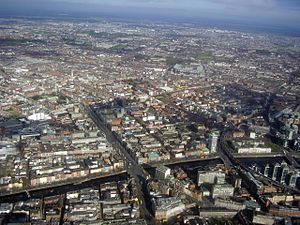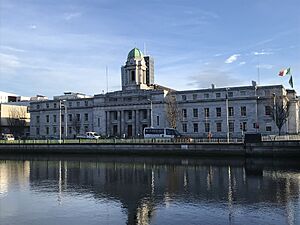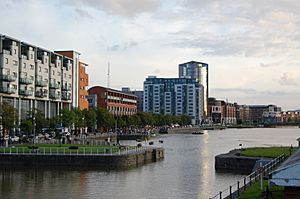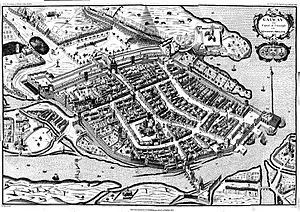City status in Ireland facts for kids
In Ireland, the word "city" means slightly different things in Northern Ireland and the Republic of Ireland.
Long ago, being a "city" was mostly a special title that brought respect, but it didn't give a place extra legal powers. This is still true in Northern Ireland, which is part of the United Kingdom. In the Republic of Ireland, being a "city" also means it has a special role in how its local government works.
Contents
List of Irish Cities
This list shows places that have been officially called a "city" at some point. Sometimes, the word "city" might have been used for other places informally.
Current Cities
Cities in Northern Ireland have a light blue background. "n/a" means "not applicable."
| Name | Status Granted | How it was Granted | Who Granted it | Recognized or Granted Status in Independent Ireland | Act | Current Location | Province |
|---|---|---|---|---|---|---|---|
| Dublin | 1172 | royal charter | Lordship of Ireland | 1922 (1937) | Constitution of the Irish Free State (Saorstát Eireann) Act, 1922 | Republic of Ireland | Leinster |
| Limerick | 1199 | royal charter | Lordship of Ireland | 1923 | Local Government (Temporary Provisions) Act, 1923 | Republic of Ireland | Munster |
| Waterford | 1202 | royal charter | Lordship of Ireland | 1923 | Local Government (Temporary Provisions) Act, 1923 | Republic of Ireland | Munster |
| Cork | 1185 | royal charter | Lordship of Ireland | 1924 (1929,1932, 2001) | "City commissioner" appointed | Republic of Ireland | Munster |
| Galway | n/a | n/a | n/a | 1985 | Local Government (Reorganisation) Act, 1985 | Republic of Ireland | Connacht |
| Kilkenny | 1383 | royal charter | Lordship of Ireland | 2014 | Local Government Reform Act 2014 | Republic of Ireland | Leinster |
| Derry | 1604 | royal charter | Kingdom of Ireland | n/a | n/a | Northern Ireland | Ulster |
| Belfast | 1888 | letters patent | United Kingdom of Great Britain and Ireland | n/a | n/a | Northern Ireland | Ulster |
| Armagh | 1994 | letters patent | United Kingdom of Great Britain and Northern Ireland | n/a | n/a | Northern Ireland | Ulster |
| Newry | 2002 | letters patent | United Kingdom of Great Britain and Northern Ireland | n/a | n/a | Northern Ireland | Ulster |
| Lisburn | 2002 | letters patent | United Kingdom of Great Britain and Northern Ireland | n/a | n/a | Northern Ireland | Ulster |
| Bangor | 2022 | letters patent | United Kingdom of Great Britain and Northern Ireland | n/a | n/a | Northern Ireland | Ulster |
Former Cities
These places used to be called cities but no longer are.
| Name | Gained Status | How it was Granted | Who Granted it | Lost Status | Current Location | Province |
|---|---|---|---|---|---|---|
| Armagh (1st time) | By 1226 | prescription | Lordship of Ireland | 1840 | Northern Ireland | Ulster |
| Downpatrick ("Down") | By 1403 | Lordship of Ireland | By 1661 | Northern Ireland | Ulster | |
| Clogher | Lordship of Ireland | 1801 | Northern Ireland | Ulster | ||
| Cashel | 1638 | royal charter | Kingdom of Ireland | 1840 | Republic of Ireland | Munster |
History of Irish Cities
Before Ireland was divided into Northern Ireland and the Republic of Ireland (around 1920–22), the whole island shared a common history for what "city" meant.
Historically, a "city" was often a town that had a main church (a cathedral) where a bishop was based. This idea came from old Roman times. However, some places like Belfast became cities later without having a cathedral.
A royal charter was a special document from the King or Queen. It officially gave a town the title of "city." This title brought prestige but didn't usually change how the town was governed.
After 1800, Ireland became part of the United Kingdom. The rules for city status then followed British law. The Municipal Corporations (Ireland) Act 1840 changed things for some cities, like Armagh and Cashel. They lost their special local governments, and it was debated if they were still "cities."
Lord Mayor Title
Some cities have a special mayor called a "lord mayor." This title is given to the mayor of certain important cities. The Lord Mayor of Dublin got this title in 1641. The Lord Mayor of Belfast got it in 1892. The Lord Mayor of Cork received the title in 1900. Armagh gained a lord mayor in 2012.
Northern Ireland Cities
After Belfast became a city in 1888, no other towns in Northern Ireland got city status for a long time.
Armagh
Armagh started trying to get its city status back in 1953. It argued that its archbishop was the most important one in Ireland. In 1994, Armagh was officially granted city status again. This was to celebrate 1,550 years since it was traditionally founded by Saint Patrick.
Lisburn and Newry
In 2000, Lisburn and Ballymena tried to become cities for the millennium celebrations, but they weren't chosen. For the Queen's Golden Jubilee of Elizabeth II in 2002, Northern Ireland was guaranteed one new city. Many towns applied. Surprisingly, both Lisburn and Newry were chosen. This caused some talk because Lisburn is mostly Protestant and Newry is mostly Catholic.
Bangor
In 2022, Bangor was one of eight towns chosen to become a city as part of the Queen's Platinum Jubilee Civic Honours. The official document granting its city status was delayed by the Queen's death. It was finally issued by the new King, Charles III, in November 2022.
Current Cities in Northern Ireland
As of late 2022, Northern Ireland has six recognized cities: Armagh, Belfast, Derry, Lisburn, Newry, and Bangor. When some of these towns became cities, their local government areas also changed their names to include "City."
Republic of Ireland Cities
When the Irish Free State was formed in 1922 (later called Ireland from 1937), it had four main cities: Dublin, Cork, Limerick, and Waterford. Galway became a fifth city in 1986.
The Local Government Act 2001 officially called these five places "cities." These cities have similar powers and functions to the administrative counties.
Limerick and Waterford
In 2014, the cities of Limerick and Waterford were combined with their surrounding counties. This created new local government areas called "Cities and Counties." For example, there is now a Limerick City and County Council. Even though they are combined, they are still officially called "cities."
Waterford is believed to be Ireland's oldest city. It was founded by the Viking Ragnall around 914 AD.
Galway
Galway was often called "the city of the Tribes" because of 14 important families who lived there. However, for a long time, it was legally considered a town. It only officially became a city in 2001 under the Local Government Act.
Kilkenny
Kilkenny is the only city in the Republic of Ireland that was not a "county borough" (a type of administrative city). In 2001, there was a discussion about whether Kilkenny would lose its "city" title. However, a special rule was added to the law. This rule allowed Kilkenny to keep using the description "city" for ceremonial and traditional purposes.
In 2014, all boroughs and towns were dissolved. The area around Kilkenny is now called the "Municipal District of Kilkenny City," which shows its unique status.
Proposed New Cities
Some towns in the Republic of Ireland have expressed interest in becoming cities. This is usually for prestige and to attract more investment. However, the government has said it has no plans to create new city councils.
Drogheda
People in Drogheda have campaigned for it to become a city. In 2012, the Drogheda Borough Council even passed a resolution allowing people to refer to Drogheda as the "City of Drogheda."
Dundalk
Dundalk's development plans have mentioned that it should achieve "City Status" to help it grow as an important regional center. There have also been ideas about a "Newry–Dundalk Twin City Region" with Newry across the border.
Sligo
In 1999, a politician suggested that Sligo should be declared a "millennium city." He argued that being called a "city" would help attract investors. Even though Sligo's main council building is called "City Hall," it is not officially recognized as a city.
Swords
Fingal County Council has a long-term plan to make Swords a city as its population grows. Their vision for 2035 is for Swords to be "an emerging green city of 100,000 people."
Tallaght
A campaign to make Tallaght a city started in 2003. Supporters believe it would help attract businesses and upgrade its local college to university status. However, its closeness to Dublin is seen as a challenge for it to become a separate city authority.
Images for kids
-
Dublin, the capital of the Republic of Ireland.









